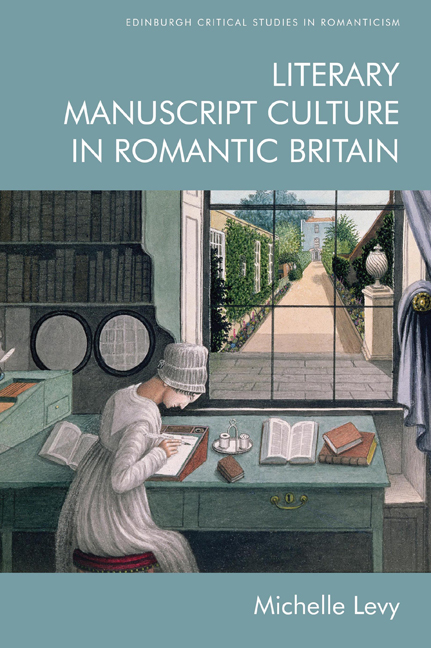Book contents
- Frontmatter
- Contents
- List of Illustrations
- Acknowledgements
- Dedication
- Introduction
- 1 Intentionality and the Romantic Literary Manuscript
- 2 Literary Reviews and the Reception of Manuscript Culture
- 3 Anna Barbauld’s Poetic Career in Script and Print
- 4 Lord Byron, Manuscript Poet
- 5 Jane Austen’s Fiction in Manuscript
- 6 Script’s Afterlives
- Afterword: Blake’s Digitised Printed Script
- References
- Index
- Plate Section
5 - Jane Austen’s Fiction in Manuscript
Published online by Cambridge University Press: 08 October 2020
- Frontmatter
- Contents
- List of Illustrations
- Acknowledgements
- Dedication
- Introduction
- 1 Intentionality and the Romantic Literary Manuscript
- 2 Literary Reviews and the Reception of Manuscript Culture
- 3 Anna Barbauld’s Poetic Career in Script and Print
- 4 Lord Byron, Manuscript Poet
- 5 Jane Austen’s Fiction in Manuscript
- 6 Script’s Afterlives
- Afterword: Blake’s Digitised Printed Script
- References
- Index
- Plate Section
Summary
After Thomas Cadell rejected First Impressions (an early version of Pride and Prejudice) unread, ‘declined by Return of Post’, in 1797, it took Jane Austen another fourteen years to break into print, with the publication of Sense and Sensibility in 1811. This fourteen-year delay was preceded by at least a decade of writing, in which she produced and collected a substantial body of fiction and satire known collectively as the ‘juvenilia’. Why did it take Austen, now regarded as one of the greatest of English novelists, nearly a quarter century to produce writing that was publishable? Austen's surviving manuscripts provide a window into her compositional process and thus allow us to better understand, and explicate, her ongoing struggle to enter print, difficulties she shared with other authors of the period, including those examined in the previous two chapters. This chapter presents a final opportunity to return to the manuscript record of a single writer, in this case a highly canonical author, working within one of the most commercial of genres, for what it can tell us about her working methods and perceptions of print. Scrupulous scholarly examination of Austen's working drafts has dispelled the myth, first perpetuated by her brother, that ‘[e]very thing came finished from her pen’. With new editions of Austen's fiction manuscripts – The Cambridge Edition of the Works of Jane Austen, Jane Austen's Manuscript Works and Jane Austen's Fiction Manuscripts: A Digital Edition, the last of which includes digital photo-facsimiles and diplomatic transcriptions of all Austen's fiction manuscripts – we enjoy unprecedented access to high-quality print and digital copies of her manuscripts that allow us to see what issued from her pen. These editions, when consulted in combination with the rich scholarly readings of her manuscripts we possess, make it possible to precisely study Austen's lifelong practices of domestic manuscript production and their likely impact on the production of her six novels.
Table 5.1 provides an inventory of Austen's surviving fiction manuscripts, which include manuscripts of all kinds, from drafts showing various states of revision to fair copies, from all periods of her writing career.
- Type
- Chapter
- Information
- Literary Manuscript Culture in Romantic Britain , pp. 182 - 213Publisher: Edinburgh University PressPrint publication year: 2020



